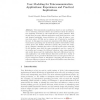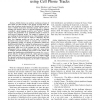9 search results - page 1 / 2 » Predicting students' happiness from physiology, phone, mobil... |
UMUAI
2008
13 years 10 months ago
2008
Abstract. Self-efficacy is an individual's belief about her ability to perform well in a given situation. Because selfefficacious students are effective learners, endowing int...
ISWC
2003
IEEE
14 years 4 months ago
2003
IEEE
Context-aware computing describes the situation where a wearable / mobile computer is aware of its user’s state and surroundings and modifies its behavior based on this informat...
DSS
2011
13 years 2 months ago
2011
Abstract: Much has been written about word of mouth and customer behavior. Telephone call detail records provide a novel way to understand the strength of the relationship between ...
UM
2010
Springer
13 years 9 months ago
2010
Springer
Abstract. Telecommunication applications based on user modeling focus on extracting customer behavior and preferences from the information implicitly included in Call Detail Record...
CSE
2009
IEEE
14 years 5 months ago
2009
IEEE
—Mobile devices can produce continuous streams of data which are often specific to the person carrying them. We show that cell phone tracks from the MIT Reality dataset can be u...


